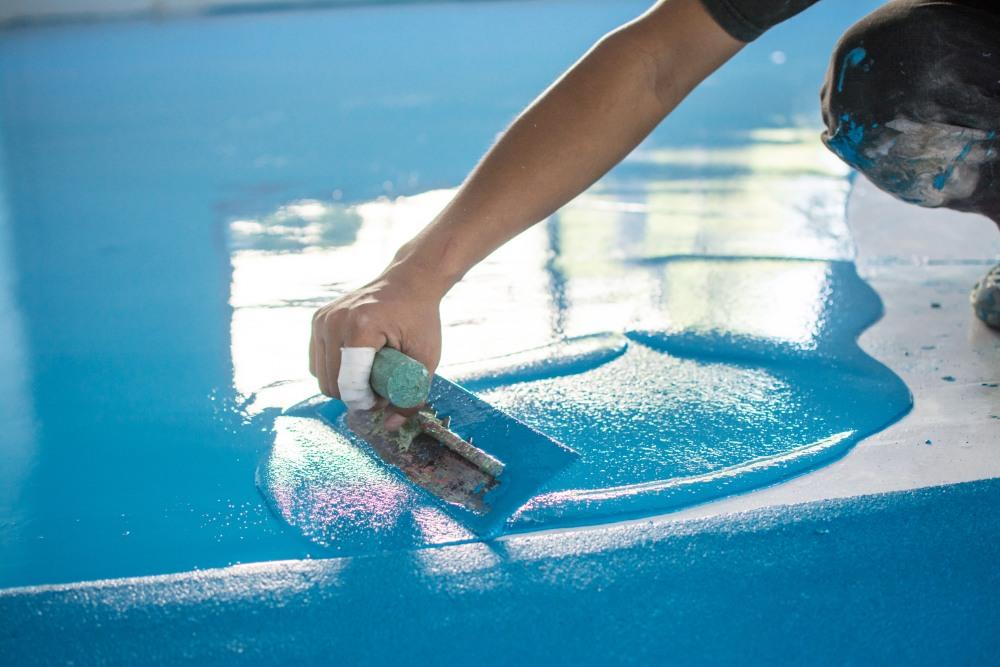Flooring is among the most important components of a property, whether it be a residential or commercial one. Along with the walls and ceiling, flooring serves as the foundation of your living space.

If you’re installing new flooring for your home, it won’t hurt to install commercial quality flooring with a warehouse flooring style made out of epoxy.
What Is An Epoxy Flooring?
Epoxy or resinous flooring is a type of flooring system made of multiple layers of epoxy above a concrete substrate. Epoxy flooring typically has a depth of two millimeters formed from layering the material. An epoxy flooring with less than a two-millimeter depth is only referred to as epoxy floor coating.
The most popular application of epoxy flooring is found in the industrial setting. You can view example here as used in warehouses, showrooms, and factories. However, they’re not just for industrial use as they can also be a part of your home such as the garage, patio, pool area, and recreational space.
Pros And Cons Of Epoxy Flooring
Before installing epoxy flooring in your home, it’s worth knowing the advantages and disadvantages it can bring, which are discussed below:
Pro: Resistance To Damage
Epoxy flooring is known for its excellent resistance to damage, making it perfect for high-traffic spaces. This flooring type is made of resin and hardener, which forms a strong plastic immune to degradation when mixed.
Specifically, epoxy flooring is resistant to damage from the following:
- Heat: Standard epoxy used in flooring can withstand 150℉ to 300℉ of heat, and even up to 600℉ for a higher grade, heat-resistant epoxy flooring. The heat-resistant property of epoxy flooring is ideal for kitchen flooring.
- Water: Flooring surfaces like wood and laminate swell and warp from continuous water exposure. If you’re located in a flood-prone area or your area is susceptible to water spills, an epoxy is a compelling option for its impervious quality.
- Chemical: Some chemicals that accumulate in your kitchen, garage, or bathroom can damage your flooring, especially when there are existing cracks on the floor. The depth of layering on the epoxy flooring can prevent these chemicals from seeping through the concrete substrate.
- Shock: Dropping heavy items on the floor is inevitable, but it won’t chip your flooring if it’s made of epoxy.
Con: Tedious Preparation And Application
Although epoxy flooring is known to withstand many environmental factors, you should have extra patience with its preparation and application process. Before pouring your first epoxy layer, you must ensure that the existing concrete floor is clean and free from any oil, grease, and solvent. Also, cracks and crevices should be filled prior to coating.
Then, before applying the succeeding layers of epoxy, every layer should dry completely. This process alone may take days to weeks. Before starting the flooring installation, you should move your household appliances and items in this area and let your family members know.
However, albeit the time constraint, you can make this process a lot more seamless and convenient by hiring flooring experts. A penetrating concrete sealer can also help you speed up the epoxy application.
Pro: Affordable And Cost-Effective
Changing your flooring is quite expensive work, particularly if the flooring installation is a part of something bigger, say a remodel or renovation. Epoxy flooring is cheaper and more cost-effective because you won’t need to remove your existing flooring, reducing labor and material costs. You can simply add it to existing concrete flooring.
Moreover, a square foot of epoxy coating only costs USD$3-12, depending on its grade and quality, and USD$1 for the installation. Considering that you only need about two to three coats of epoxy, it’s still a good, affordable option. Although floor tile materials are cheaper, from USD$3-5 only, the installation costs are significantly pricier, and the longevity and maintenance of epoxy flooring remain unparalleled.
Con: Difficulty In Walking
Mobility and comfort are two critical factors when choosing the right flooring. These factors highly rely on one’s needs and preferences, so an epoxy flooring may be okay for some and a bad option for others. Since epoxy is a hard material, it creates noise when walking, which could bother some people in high-traffic areas.
Also, the smooth, hard finish of epoxy makes it skid resistant. Children and older adults will have difficulty walking on this surface, especially when your floor is wet. Therefore, epoxy flooring isn’t a good option in spaces that are usually wet like the bathroom. If you’re living with kids and the elderly, you might want to reconsider another flooring option or spend extra on anti-slip floor coating.
Is Epoxy Flooring Right For You?
Epoxy flooring is an economical, convenient option for homeowners prioritizing the durability, longevity, and price of their flooring. As every flooring material has its own pros and cons, the decision is mainly up to you—and if you’re willing to compromise with the discussed disadvantages to get the most from its advantages.





